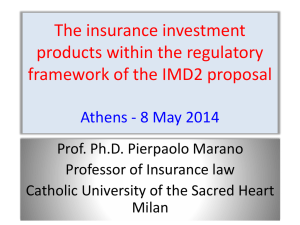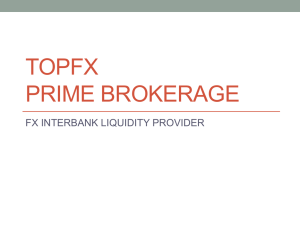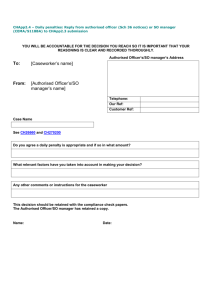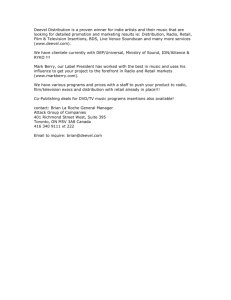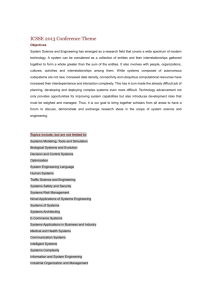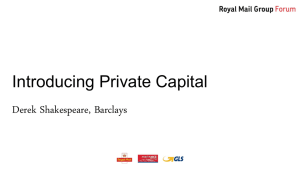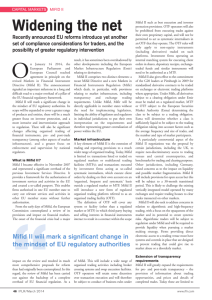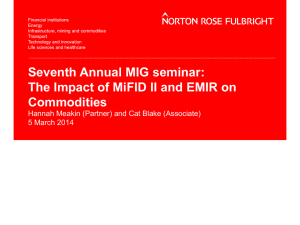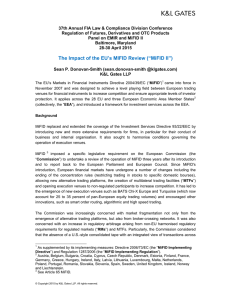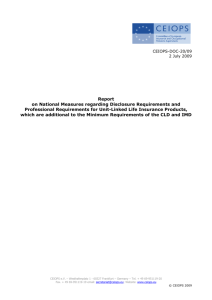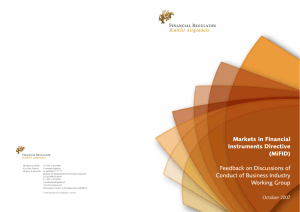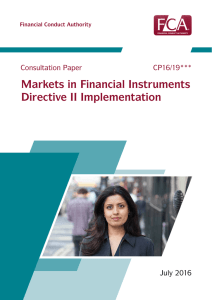MIFID Client Categorisation
advertisement
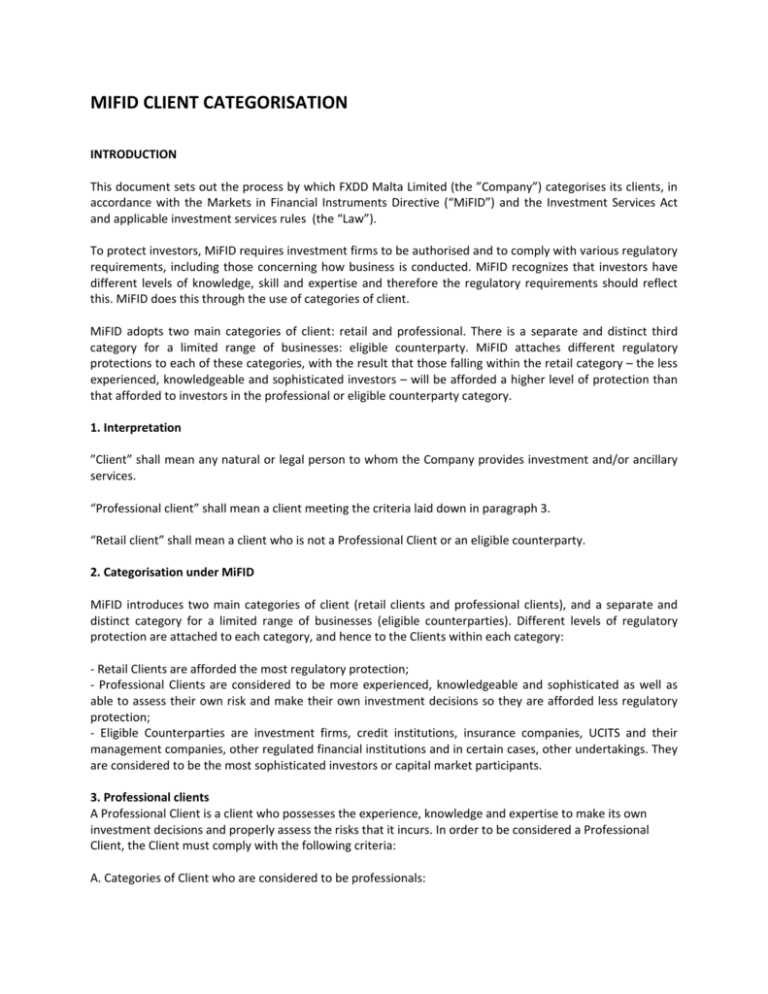
MIFID CLIENT CATEGORISATION INTRODUCTION This document sets out the process by which FXDD Malta Limited (the ”Company”) categorises its clients, in accordance with the Markets in Financial Instruments Directive (“MiFID”) and the Investment Services Act and applicable investment services rules (the “Law”). To protect investors, MiFID requires investment firms to be authorised and to comply with various regulatory requirements, including those concerning how business is conducted. MiFID recognizes that investors have different levels of knowledge, skill and expertise and therefore the regulatory requirements should reflect this. MiFID does this through the use of categories of client. MiFID adopts two main categories of client: retail and professional. There is a separate and distinct third category for a limited range of businesses: eligible counterparty. MiFID attaches different regulatory protections to each of these categories, with the result that those falling within the retail category – the less experienced, knowledgeable and sophisticated investors – will be afforded a higher level of protection than that afforded to investors in the professional or eligible counterparty category. 1. Interpretation ”Client” shall mean any natural or legal person to whom the Company provides investment and/or ancillary services. “Professional client” shall mean a client meeting the criteria laid down in paragraph 3. “Retail client” shall mean a client who is not a Professional Client or an eligible counterparty. 2. Categorisation under MiFID MiFID introduces two main categories of client (retail clients and professional clients), and a separate and distinct category for a limited range of businesses (eligible counterparties). Different levels of regulatory protection are attached to each category, and hence to the Clients within each category: - Retail Clients are afforded the most regulatory protection; - Professional Clients are considered to be more experienced, knowledgeable and sophisticated as well as able to assess their own risk and make their own investment decisions so they are afforded less regulatory protection; - Eligible Counterparties are investment firms, credit institutions, insurance companies, UCITS and their management companies, other regulated financial institutions and in certain cases, other undertakings. They are considered to be the most sophisticated investors or capital market participants. 3. Professional clients A Professional Client is a client who possesses the experience, knowledge and expertise to make its own investment decisions and properly assess the risks that it incurs. In order to be considered a Professional Client, the Client must comply with the following criteria: Α. Categories of Client who are considered to be professionals: For the purposes of this Law, the following shall be regarded as professionals in relation to all investment services and activities and financial instruments: 1. Entities which are required to be authorised or regulated to operate in the financial markets. The list below should be understood as including all authorised entities carrying out the characteristic activities of the entities mentioned – entities authorised by a member state under a European Community Directive, entities authorised or regulated by a member state without reference to such Directive, and entities authorised or regulated by a non Member State: (a) Credit institutions; (b) Investment Firms; (c) Other authorised or regulated financial institutions; (d) Insurance undertakings; (e) Collective investment schemes and management companies of such schemes; (f) Pension funds and management companies of such funds; (g) Commodity and commodity derivatives dealers; (h) Locals; (i) Other institutional investors. 2. Large undertakings meeting two of the following size requirements, on a proportional basis: - balance sheet total at least: 20’000’000 Euro; - net turnover at least: 40’000’000 Euro; - own funds at least: 2’000’000 Euro. 3. National and regional governments, public bodies that manage public debt, central banks, international and supranational institutions such as the World Bank, the International Monetary Fund, the European Central Bank, the European Investment Bank and other similar international organisations. 4. Other institutional investors whose main activity is to invest in financial instruments, including entities dedicated to the securitisation of assets or other financial transactions. The entities mentioned above are considered to be professionals. Any Clients not falling within this list are, by default, Retail Clients. It is the responsibility of the Client, considered to be a Professional Client, to ask for a higher level of protection where it deems it is unable to properly assess or manage the risks involved. This higher level of protection will be provided when a Client who is considered to be a professional enters into a written agreement with the Company to the effect that it shall not be treated as a professional for the purposes of the applicable conduct of the business regime. Such an agreement should specify whether this applies to one or more particular services or transactions, or to one or more types of product or transaction. Β. Clients who may be treated as professionals on request: 1. Identification criteria Clients other than those mentioned in Part A above, including public sector bodies and private individual investors, may also be allowed to waive some of the protections afforded by the conduct of business rules. The Company should therefore be allowed to treat any of the above Clients as professionals provided the relevant criteria and procedures mentioned below are fulfilled. These Clients should not, however, be presumed to possess market knowledge and experience comparable to that of the categories listed in Part A above. A client who does not fall under any of the categories in Section A above may be also be treated as a professional client upon request. The Company will forward a questionnaire in order to establish whether the client possesses sufficient experience, knowledge and expertise to enable him/her to make his/her own investment decisions and properly assess the risks that such investment incurs. In the course of this assessment two of the following criteria, as a minimum, should be satisfied: - the Client has carried out transactions, of significant size, on the relevant market at an average frequency of 10 per quarter over the previous four quarters; - the size of the Client's financial instrument portfolio, defined as including cash deposits and financial instruments exceeds 500’000 Euro; - the Client works or has worked in the financial sector for at least one year in a professional position, which requires knowledge of the transactions or services envisaged. 2. Procedure The Clients defined above may waive the benefit of the detailed rules of conduct only where the following procedure is followed: - they must state in writing to the Company that they wish to be treated as professional clients, either generally or in respect of a particular investment service or transaction, or type of transaction or product; - the Company must give them a clear written warning of the protections and investor compensation rights they may lose; - they must state in writing, in a separate document from the contract, that they are aware of the consequences of losing such protections. Before deciding to accept any request for a waiver, the Company must take all reasonable steps to ensure that the Client requesting to be treated as a Professional Client meets the relevant requirements stated in paragraph (1) of Part B above. Professional Clients are responsible for keeping the Company informed about any change, which could affect their current categorisation. Should the Company become aware however that the Client no longer fulfils the initial conditions, which made him eligible for a professional treatment, the Company must take appropriate action. 4. Eligible counterparties Eligible counterparties are any of the following entities to which a credit institution or an investment firm provides the services of reception and transmission of orders on behalf of clients and/or execution of such orders and/or dealing on own account: (a) Investment Firms or other investment firms; (b) Credit institutions; (c) Insurance companies; (d) UCITS and UCITS management companies; (e) Pension funds and their management companies; (f) Other financial institutions authorized by a Member State or regulated under Community legislation or the national law of a Member State; (g) Undertakings exempted from the application of the Law in accordance with the MIFID in terms of Article (l) (k) and (l) thereof; and (l) of subsection (2) of section 3; (h) National governments and their corresponding offices, including public bodies that deal with public debt; (i) Central banks and supranational institutions. 5. Request for Different Classification The Retail Client has the right to request the different classification of Professional Client but he/she will be afforded a lower level of protection. The Company is not obliged to deal with him/her on this basis. The Professional Client has the right to request the different classification of Retail Client in order to obtain a higher level of protection. The Company is not obliged to deal with the Client on this basis. The Eligible Counterparty has the right to request a different classification of either as a Professional Client or Retail Client in order to obtain a higher level of protection. The Company is not obliged to deal with the Client on this basis. FXDD Malta Limited is licensed to provide investment services under Category 3 and is regulated by the Malta Financial Services Authority.
